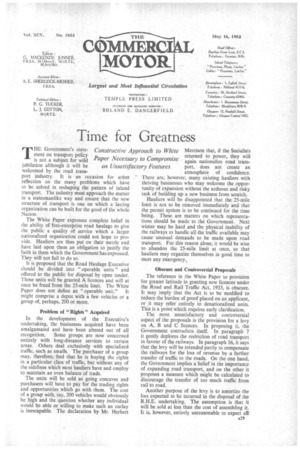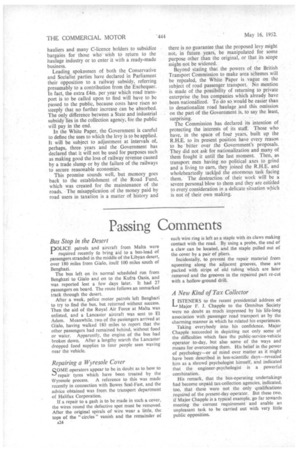Time for Greatness
Page 25

Page 26

If you've noticed an error in this article please click here to report it so we can fix it.
THE Government's stateConstructive Approach to White ment on transport policy is not a subject for wild Paper Necessary to Compromise jubilation although it will be on Unsatisfactory Features welcomed by the road trans port industry. It is an occasion for sober -reflection on the many problems which have to be solved in reshaping the pattern of inland • transport. The industry must approach the matter in a statesmanlike way and ensure that the new structure of transport is one on which a lasting organization can be built for the good of the whole Nation.
The White Paper expresses complete belief in the ability of free-enterprise road haulage to give the public a quality of service which a larger nationalized organization could not hope to provide. Hauliers are thus put on their mettle and have laid upon them an obligation to justify the faith in them which the Government has expressed. They will not fail to do so.
It is proposed that the Road Haulage Executive should be divided into "operable units" and offered to the public for disposal by open tender. Those units will be granted A licences and will at once be freed from the 25-mile limit. The White Paper does not define an "operable unit." It might comprise a depot with a few vehicles or a group of, perhaps, 200 or more.
Problem of "Rights" Acquired In the development of the Executive's undertaking, the businesses acquired have been amalgamated and have been altered out of all recognition. Some groups are now concerned entirely with long-distance services to certain areas. Others deal exclusively with specialized traffic, such as smalls. The purchaser of a group may, therefore, find that he is buying the rights in a particular class of traffic, but without any of the sidelines which most hauliers have and employ to maintain an even balance of trade.
The units will be sold as going concerns and purchasers will have to pay for the trading rights and opportunities which go with them. The cost of a group with, say, 200 vehicles would obviously be high and the question whether any individual would he able or willing to make such an outlay is inescapable. The declaration by Mr. Herbert Morrison that, if the Socialists returned to power, they will again nationalize road transport, does not create an atmosphere of confidence. There are, however, many existing hauliers with • thriving businesses who may welcome the opportunity of expansion without the arduous and risky task of building up .a new business from scratch.
Hauliers will be disappointed that the 25-mile limit is not to be removed immediately and that the permit system is to be continued for the time being. These are matters on which representations should be made to the Government. Next winter may be hard and the physical inability of the railways to handle all the traffic available may cause unusual demands to be made upon road transport. For this reason alone, it would be wise to abandon the 25-mile limit at once, so that hauliers may organize themselves in good time to meet any. emergency., Obscure and Controversial Proposals The reference in the White Paper to provision for greater latitude in granting new licences under the Road and Rail Traffic Act, 1933, is obscure. It may imply that the Act is to be modified to reduce the burden of proof placed on an applicant, or it may refer entirely to denationalized units. This is a point which requires early clarification.
The most unsatisfactory and controversial aspect of the proposals is the provision for a levy on A, B and C licences. In proposing it, the Government contradicts itself. In paragraph 7 it gently deplores the restriction of road transport in favour of the railways. In paragraph 16, it says that the levy will be intended partly to compensate the railways for the loss of revenue by a further transfer of traffic to the roads. On the one hand, the Government implies a belief in the importance of expanding road transport, and on the other it proposes a measure which might be calculated to discourage the transfer of too much traffic from rail to road.
Another purpose of the levy is to amortize the loss expected to be incurred in the disposal of the R.H.E. undertaking. The assumption is that it will be sold at less than the cost of assembling it. It is, however, entirely unreasonable to expect all hauliers and many C-licence holders to subsidize bargains for those who wish to return to the haulage industry or to enter it with a ready-made business.
Leading spokesmen of both the Conservative and Socialist parties have declared in Parliament their opposition to a railway subsidy, referring presumably to a contribution from the Exchequer. In fact, the extra £4m. per year which road transport is to be called upon to find will have to be passed to the public, because costs have risen so steeply that no further increase can be absorbed. The only difference between a State and industrial subsidy lies in the collection agency, for the public will pay in the end.
In the White Paper, the Government is careful to define the uses to which the levy is to be applied. It will be subject to adjustment at intervals of, perhaps, three, years and the Government has declared that it will not be used for purposes such as making good the loss of railway revenue caused by a trade slump or by the failure of the railways to secure reasonable economies.
This promise sounds well, but memory goes back to the establishment of the Road Fund, which was created for the maintenance of the roads. The misapplication of the money paid by road users in taxation is a matter of history and there is no guarantee that the proposed levy might not, in future years, be manipulated for some purpose other than the original, or that its scope might not be widened.
Beyond stating that the powers of the British Transport Commission to make area schemes will be repealed, the White Paper is vague on the subject of road passenger transport. No mention is made of the possibility of returning to private enterprise the bus companies which already have been nationalized. To do so would be easier than to denationalize road haulage ,and this omission on the part of the Government is, to say the least, surprising.
The Commission has declared its intention of protecting the interests of its staff. Those who have, in the space of four years, built up the R.H.E. to its present position have every reason to be 'bitter over the Government's proposals. They did not ask for nationalization and many of them fought it until the last moment. Then, as transport men having no political axes to grind and a living to earn, they joined the R.H.E. and wholeheartedly tackted the enormous task facing them. The destruction of their work will be a severe personal blow to them and they are entitled to every consideration in a delicate situation which is not of their own making.




















































































